|
|
|
Sort Order |
|
|
|
Items / Page
|
|
|
|
|
|
|
| Srl | Item |
| 1 |
ID:
128533
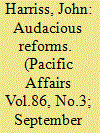

|
|
|
|
|
| Publication |
2013.
|
| Summary/Abstract |
An introduction is presented to a section of articles on the topic of India's social policies in which the author discusses the country's welfare legislation and their Land Acquisition, Rehabilitation and Resettiement Bill (LARRB).
|
|
|
|
|
|
|
|
|
|
|
|
|
|
|
|
| 2 |
ID:
142838
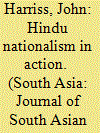

|
|
|
| 3 |
ID:
187418
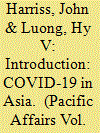

|
|
|
|
|
| Summary/Abstract |
In this introduction to studies of the politics of the COVID-19 pandemic in four Asian states—India, Pakistan, Vietnam, and South Korea—we first discuss the difficulties in evaluating the performances of different countries, given the varying reliability of data and the different possible criteria that may be applied. In our studies we aim rather to illuminate the process of different state responses, and we go on to summarize evidence on different patterns of response across Asia, situating the four country studies in a comparative context. We then review arguments in the literature about the determinants of different responses, before presenting our framework for the analysis of the politics that underlie these differences. Political leadership has undoubtedly exercised a powerful influence, but in the structural context of the relationships of state and citizens. We argue that understanding of these relationships is advanced by an analytical framework that draws on state-in-society approaches developed in the work of Joel Migdal, Michael Mann, and Peter Evans.
|
|
|
|
|
|
|
|
|
|
|
|
|
|
|
|
| 4 |
ID:
076069
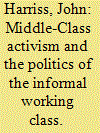

|
|
|
|
|
| Publication |
2006.
|
| Summary/Abstract |
This article, drawing on the results of both survey research and of ethnography in Delhi, Bangalore, and Chennai, concerns the relationships between the middle class and the informal working class in Indian cities in the sphere of civil society. These relationships are shown to be very significant in the definition of the "middle class" and a critical dimension of the reproduction of class relationships. They also demonstrate that civil society should not be abstracted from the field of class relations, in the way that characterizes some contemporary arguments about the potentials of civil organization. Civil society is shown to be distinctly stratified. On the whole it is a sphere of middle class activism, and such activism is one of the defining features of the middle class. Members of the informal working class, on the other hand, are largely excluded from active participation in civil society organizations, so that increasing opportunities for political participation through civil organization may be associated with increased political inequality. The exceptions to this general rule are sometimes interlinked movements for women's rights, for the rights of informal workers, and for rights to housing-in which women from the informal working class are notably active. The issues of housing and of rights to livelihood, however, frequently bring the middle class and the informal working class into contention. Politics is often the only resource available to informal workers and their valuation of electoral democracy is to be understood in this context
|
|
|
|
|
|
|
|
|
|
|
|
|
|
|
|
| 5 |
ID:
074570
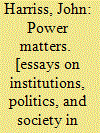

|
|
|
|
|
| Publication |
New Delhi, Oxford University Press, 2006.
|
| Description |
314p.
|
| Standard Number |
0195678974
|
|
|
|
|
|
|
|
|
|
|
|
Copies: C:1/I:0,R:0,Q:0
Circulation
| Accession# | Call# | Current Location | Status | Policy | Location |
| 051855 | 320.954/HAR 051855 | Main | On Shelf | General | |
|
|
|
|
| 6 |
ID:
053462
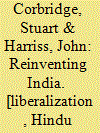

|
|
|
|
|
| Publication |
New Delhi, Oxford University Press, 2003.
|
| Description |
xxvi, 313p.pbk
|
| Series |
Preface to the Paperback Edition
|
| Standard Number |
0195662776
|
|
|
|
|
|
|
|
|
|
|
|
Copies: C:2/I:0,R:0,Q:0
Circulation
| Accession# | Call# | Current Location | Status | Policy | Location |
| 043798 | 954.04/COR 043798 | Main | On Shelf | General | |
| 048528 | 954.04/COR 048528 | Main | On Shelf | General | |
|
|
|
|
| 7 |
ID:
105183
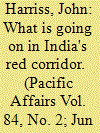

|
|
|
|
|
| Publication |
2011.
|
| Summary/Abstract |
Drawing on the small number of recent ethnographic studies, on reports by human rights activists, and on some reports by journalists, this paper explores reasons for the strength of the Maoist insurgency across the "red corridor": a large tract of India, from the border with Nepal through to the south. It finds that while the "feasibility thesis," as developed by Fearon and Laitin in particular, amongst recent general theorists of the determinants of civil war and insurgency, has explanatory power, there is also evidence of the significance of "grievance," especially amongst the tribal people of central India. The Maoists have certainly not always been the drivers of resistance to the many cases of realized or attempted dispossession across the region, but they seem to be sympathetic to movements of resistance, and often to articulate grievances against the state, both for what it has done (encouraging expropriation for mining, infrastructural and industrial projects) and for what it has not done (in the supply of basic services). The alternative "greed" hypothesis is found to be less strongly supported, though rents from the rich mineral and forest resources of central India do play a part in the story. The Maoists support people's aspirations but their supportive moves can be in contradiction with their broader strategic ambitions-of taking over state power-and the spiral of violence that often follows can end up betraying those whom they claim to support.
|
|
|
|
|
|
|
|
|
|
|
|
|
|
|
|
|
|
|
|
|